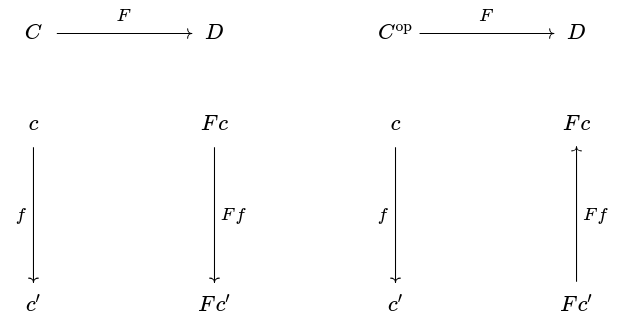Since categories are mathematical objects, it leads to the question of morphisms between categories.
Functor
A functor between categories satisfies
- An object for each
- A morphism for each morphism
The following functoriality axioms must hold:
- For any composable in ,
- For each ,
A functor is a mapping of objects and morphisms that preserves the structure of a category.
Some examples:
-
The endofunctor given by taking a set to its power set and function to the direct-image function which maps to the image .
-
Concrete categories have the forgetful functor which sends objects to their underlying sets and morphisms to their underlying function.
-
The fundamental group is a functor that maps continuous functions to group homomorphisms .
We can use functors to prove various results about spaces. For example, consider Brouwer’s fixed point theorem which states any continuous endomorphism of a 2-dimensional disk has a fixed point:
For the sake of contradiction let such that for all . Consider the continuous function which casts a ray from the disks center through onto the boundary . As a result defines a retraction on the inclusion , i.e., .
For any any basepoint on apply the functor to get a pair of group homomorphisms
By the functoriality axioms
But and . So we expect to be the zero endomorphism. A contradiction.
Contravariant functor
A contravariant functor from to is a functor satisfies
- An object for each
- A morphism for each morphism
The following functoriality axioms must hold:
- For any composable in
- For each ,
The difference between (covariant) functors and contravariant functors can be summed up with the following diagram:

Some examples:
- The contravariant power set functor sends a set to its power set and a function to the inverse-image function that maps to .
- The functor carries spaces to its poset of open subsets.
Lemma
Functors preserve isomorphism.
Proof: Let be a functor and an isomorphism in with inverse . By the functoriality axioms,
and
Note that a functor may not preserve monomorphisms or epimorphisms. But it does preserve split monomorphisms and split epimorphisms.
Def
If is locally small, then for any we get a pair of covariant and contravariant functors represented by :
- the functor carries to and morphisms to post-composition
- the functor carries to and morphisms to pre-composition .
The pair of functors in the previous definition can be encoded into a single bifunctor, i.e., a functor with two variables.
Product
For categories their product is the category where
- objects are ordered pairs
- morphisms are ordered pairs
- composition and identities are defined componentwise.
Two-sided represented functor
If is locally small, then there is a two-sided represented functor where a pair of objects are mapped to the hom-set and a pair of morphisms and is sent to the function which maps to .